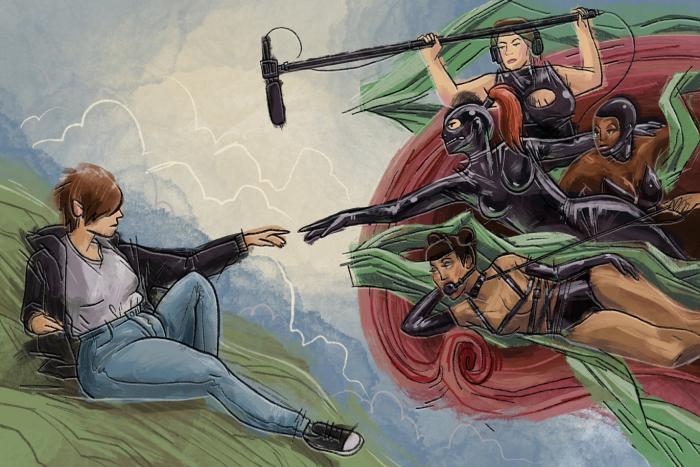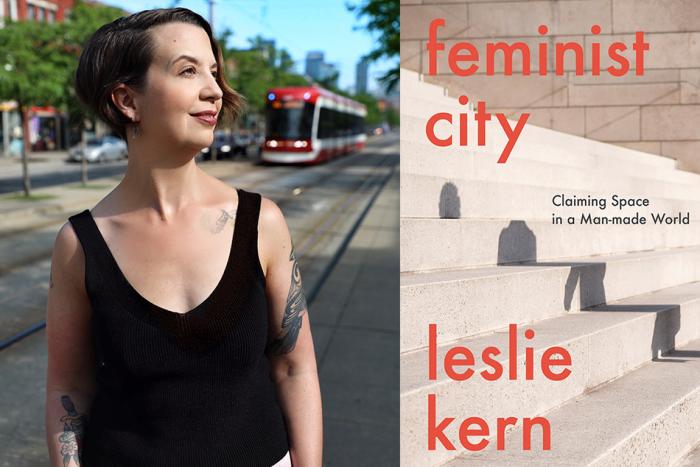Ottessa Moshfegh is famous for writing about uncomfortable characters experiencing uncomfortable circumstances. When I received the press copy of her latest novel, Death in Her Hands (Penguin Press), COVID-19 was, in North America, a penumbra hovering over the early weeks of 2020. By the time I spoke with Moshfegh in early June, the world had changed—becoming, at least for many, a distinctly more uncomfortable place.
The protagonist and narrator of Death in Her Hands is an older woman named Vesta Gul (her surname, perhaps tellingly, is oft mispronounced as “Ghoul”). A 72-year old widow, Vesta lives modestly in an isolated cabin in the New England woods with her dog, Charlie. At the beginning of the book, Vesta finds a note that reads: “Her name was Magda. Nobody will ever know who killed her. It wasn’t me. Here is her dead body.”
There is no body nearby, but discovering the note sets Vesta into motion as an amateur detective. Fleeting impressions of rural neighbours, highway police officers, and strangers from the nearby town, Levant, commingle with dark memories of Vesta’s late husband as she knits together the story of the purportedly murdered woman’s life. Facts blur with Vesta’s imagination as she races to solve—or write—the mystery.
Often projecting her own life and identity onto the mysterious Magda, Vesta develops a rich and writerly character study. Suddenly the individuals Vesta encounters in town, the books she finds at the library, and her own path through the woods are enriched with a sense of unforeseen purpose. By turns suspenseful, ominous, and eerily self-reflective, and with dashes of Moshfegh’s signature macabre comedy, Death in Her Hands takes the reader deep into the mind of a troubled narrator.
Esmé Hogeveen: At the beginning of Death in Her Hands, Vesta’s life is self-contained and regimented. Vesta’s routines and repetition reminded me of the narrator’s intense desire to retreat in [your 2018 novel] My Year of Rest and Relaxation. May I ask if the experience of boredom—or a lack of external stimuli—is something that interests you?
Ottessa Moshfegh: I would never think of Vesta as bored, per se. By typical measurements, her life is empty and we might get bored of being her, but Vesta survives on the food of her mind. Her life in the cabin with her dog is in some ways very similar to her former life with her late husband, Walter—though Walter was disloyal and Charlie is mostly loyal. The main difference is that now Vesta has her freedom.
When you ask about boredom, the first thing that comes to mind are limits or feeling stuck, whether due to self-imposed or external forces. Like when you’re a kid and nothing good is on TV. I think that, when the book begins, Vesta has just emerged from a period of great boredom and is ready to be fascinated. Now that Walter has passed away, and she’s alone and in isolation, everything she does has more meaning and weight behind it. Her thoughts matter now.
I was intrigued by Vesta’s self-aware, almost writerly perspective. It often feels like she anticipates the reader’s attention.
I think that comes from having been watched so closely her entire life. Vesta was scrutinized by her husband and before that by her parents and society. She always felt obliged to behave according to other people’s prescriptions and now that she’s alone, she’s still addicted to certain habits of social decorum. For instance, she feels ashamed to leave the house without brushing her teeth. But she’s also finding ways to break free of those pressures and to pursue her own story.
I imagine this topic has come up a lot under present pandemic circumstances, but I’m curious if you think that Vesta’s willful isolation gives her imagination extra license? Specifically, I’m thinking about when Vesta completes the character profile questionnaire from the “TOP TIPS FOR MYSTERY WRITERS” website and thinks, “Magda’s past was mine to discover and know, and I felt I knew her so well already. All I had to do was think.”
I think that Vesta’s curiosity about Magda is really a way for Vesta to be curious about herself. Vesta’s depiction—and invention—of Magda’s personality is a projection of who Vesta wishes she herself had been. Like any kind of creative fiction storytelling, the writer invents what doesn’t exist, so the note functions as a prompt for her imagination.
On the topic of imagination, I found the line about Vesta choosing to downsize after Walter’s death enlightening: “I felt I needed to hide a little. My mind needed a smaller world to roam.” Do you see comfort and independence as complimentary or juxtaposed in Vesta’s quest for freedom?
Before Magda appeared in her life, Vesta tried to structure her time in a way that felt comforting. Without a plan or a loose structure for the day, I don’t think Vesta would know how to function. I think she really fears going crazy or having her mindspace expand beyond her control.
Vesta’s experience of mental expansion interests me, because I’m curious about people being afraid of their own minds. I like to think about what aspects of personality are innate, like what exactly is the spirit or the soul or whatever you want to call it? And how much of it do we create, whether via intentional cultivation or in response to situations that force us to adapt?
I enjoy putting characters in blank spaces, separated from any worldly attachments, and then seeing how free they are to be themselves. Then I can ask: Who is this character really? And who is she in relation to the world that she inhabits? Vesta, for instance, may be elderly, but I felt that she was very young in spirit. Magda’s note becomes Vesta’s excuse to explore a new environment and to enact Vesta’s twelve-year-old self’s fantasy. I really do think that when Vesta goes into the woods, she knows it will hurt her—like a child leaving the nest. I think she anticipates that the journey will be painful, but will take her where she needs to go. The walk in the woods ultimately leads Vesta to her death, which is where she needed to go.
Shattering!
Yeah, she had no life left to live, especially after her dog, the only creature left on earth who knew her, is gone.
Death in Her Hands deals quite explicitly with crime and mystery genres. I’ve been reflecting that many of your readers may be millennials who grew up watching CSI, Law and Order, or other grisly procedurals, which were then widely accepted as appropriate family entertainment and a way to learn about plot and storytelling. I’m curious whether writing this book led you to rethink crime storytelling and its place in pop culture?
I can’t say that I have ever really read a crime novel, but I am a huge consumer of true crime documentaries and always have been. I watched America’s Most Wanted all the time as a child. I think people enjoy feeling scared, but we also like to think we can outsmart a criminal or prove their guilt. Psychologically, solving a mystery can be empowering. It’s a variation of the salvation narrative—like, “I was once clueless, but then I got really smart!” And I think mystery novels and movies and CSI help viewers feel smarter than the criminal and the victim, or at least that’s part of the appeal whether or not it’s true.
Within the mystery genre, there is often a crime fighting partnership between an obsessive, intellectual, mystery solver—the Sherlock Holmes, if you will—and a more tempering, self-aware sidekick, who has better social skills—the John Watson. In lieu of a human sidekick, Vesta has Charlie, the dog, with whom she has an alternately doting and abusive relationship. Did it feel important to keep Vesta’s allies in the non-human realm? I’m also curious whether you envisioned Magda as a kind of quasi-sidekick?
Not having a witness is an interesting predicament. Consciously or unconsciously, I think people act very differently when they know someone’s observing them and I think that Vesta’s witness is actually the reader. Sort of like [Moshfegh’s 2015 novel] Eileen, there’s the sense that we’re being delivered a story specifically meant for us. It’s not a diary; it’s a directed story that’s trying to convey something particular. It’s measured and well-behaved storytelling, which reflects Vesta’s character. Even in her private thoughts, she tries to be well-behaved.
From the very beginning of the novel, we’re introduced to questions around storytelling and the narrator’s integrity. On only the third page, Vesta muses: Nobody will ever know who killed [Magda]. The story is over just as it’s begun. Was futility a subject worthy of exploration? I’m curious if you think there’s a certain kind of detective or narrator—perhaps these are one and the same—who would prefer that the mystery remain unsolved? In other words, does keeping the mystery of who killed Magda open give Vesta a much-needed sense of purpose?
Definitely! Vesta’s crime solving becomes a solipsistic process, whereby things that she imagines somehow become real. Whether or not that reflects an element of her own madness, or whether there’s a strange conspiracy, or whether Magda is a ghost whispering clues—we’re meant to question these possibilities. The book’s clues are not traditional.
It’s hard for me to talk about the book as a detective novel though, because as I was writing it I had no idea what the mystery would be. I think there are various readings of questions like: Who left the note and why? Was it left by the couple who host a murder mystery party? I felt more invested in allowing my narrator to feel and see things, and to try to make sense of them for herself, than in trying to represent a mystery that could be, at least conventionally, solved.
There’s a recurring theme of consumption in your previous writing and food comes up a lot in Death in Her Hands. There’s something kind of sad about Vesta’s sense of what she deserves. Early on, she makes a point of explaining that she shares a diet with her dog for mostly utilitarian purposes. At one point, she describes the bagels she eats every morning for breakfast: I hadn't bought myself a toaster. It seemed like an unnecessary luxury when I had a perfectly good oven. But who wants to heat an entire oven just to warm a bad bagel? It didn’t matter. I ate them cold, one every morning, Tuesday through Sunday. Is reflecting on what, and how, an individual consumes an important aspect of your character-building process?
You’re right, consumption is something that I tend to write about a lot! In [2014’s] McGlue, it’s alcohol. In Eileen, it’s alcohol or food, or the magazines she reads and the movies she watches. And then in My Year of Rest and Relaxation, there is the narrator’s constant calibration and consumption of medication, as well as Reva’s eating disorder. I think a lot can be said about a character when we talk about how he or she eats a meal. I mean, it’s something that we all have to do. And for some people, eating or otherwise consuming can be especially expressive.
I can relate to Vesta’s disinterest in pleasure and how that manifests in willful self-neglect. I think there’s something chemical that happens when you’re always a little bit hungry. When you don’t allow yourself to be fully satiated, hunger spreads out into the rest of you. You become a little agitated and more mindful of the clock. You start asking yourself: How am I spending my time? It made sense for Vesta to be a little underfed and it also plays out in her judgment of the women in town. Their lives are so completely different than Vesta’s, and she feels both disgust and awe when she sees them filling their supermarket carts. I interpret Vesta’s judgment as also reflecting a great deal of envy and a bit of defensiveness about her own anorectic mindset. Part of how I understood Vesta is that she deprives herself in certain ways in order to delineate a unique identity. But if what’s accomplishing creating that identity is not toasting your supermarket bagel, it’s pretty sad, you know?
Several of the characters Vesta interacts with—including the gas station attendant, the police officer, and the middle-class couple hosting the murder mystery party—represent some of the different identities, class positions, and ways of living associated with New England. I know that you’ve had various experiences living on the east coast, so I’m curious if you were consciously interested in considering that setting from an older character’s perspective?
Yeah, an older character and also an outsider with no allegiances, who doesn’t trust anyone, especially not the police. I tried to resist identifying the specific locations of Levant or Bethsmane, but I drew from memories of rural Maine, where I’ve spent a lot of time. My family has a cabin, well, a small camp, on a lake outside of Bangor. I don’t know if you’ve read my short story collection [Homesick for Another World], but there’s one story, “Slumming,” about a middle-class teacher from the city who buys a foreclosure in a poverty-stricken town and treats it like a fancy getaway. She goes there every summer and feels really rich. In that story, I also drew from my experiences around Bangor, because as an outsider who could afford to use that space to vacation, my perspective was different from the guys who worked at the gas station. I relate to that town as an outsider and yet it still feels like a kind of home.
This is all to say that in Death in Her Hands, I tried to relate to a rural setting from the perspective of an outsider. This is perhaps paralleled in Vesta imagining that Magda is a young girl from Belarus who gets a summer job at a McDonald’s. That idea was also based on a real thing. There are programs that hire Eastern European teenagers to work in highway fast food restaurants every summer in New England as a way to practice their English. It always struck me as the weirdest thing. Imagine coming from Ukraine and suddenly being in rural New Hampshire. How would someone in that position experience America?
Returning to the idea of the crime or mystery genre, it’s a cliché to say that “time is of the essence,” but it does seem like time is often mentioned as one of the most valuable resources when tracking a missing person. The events of Death in Her Hands unfold quite quickly, but it’s rare that Vesta expresses urgency around time. As you’ve mentioned, the book’s setting is somewhat vague. Did you also set out to write a narrator with an ambiguous relationship to time?
Absolutely! Vesta keeps track of the days based on how many bagels are left in a package. In a way, it’s similar to how many of us are living now, at least those of us who aren’t leaving the house to work, that is. I think that when you’re alone and you have no external responsibilities, time starts to pass differently. I know that I’ve become less aware of the clock and have maybe begun paying more attention to other physical cues. Like, oh, it’s not hot out yet, should I go outside? Or, is night falling? Should I take my walk now? Moments like that.
In part, I think Vesta becomes more attuned to the natural world because she lives as a vulnerable human in a rural area. But I also think that she constantly experiences a very subtle sense that someone might be out there, and her lack of responsibilities mean that her sense of time can easily become disordered. When it’s dark, Vesta’s fears become more poignant. She feels more alone in the darkness, which I think is kind of cool. I also like that she orders a darkness suit as armour, and that she equates safety with being invisible or inconsequential is quite telling.
I read your recent piece in The Guardian reflecting on the COVID-19 lockdown. I thought it was fascinating when you observed that the narrator of My Year of Rest and Relaxation is “isolating herself towards wellness.” Given our context speaking now when many people fear a second wave, I wanted to ask if you have any thoughts or feelings about how the pandemic context will influence people reading Death in Her Hands?
This whole thing is so weird, and what’s happening right now with the protest movement across the country and what has happened to precipitate that in the recent past and in the entire history of our country… I mean, a story about a little old lady in the woods does not seem all that important, so I feel very humbled by this moment in the history of our culture. I’m praying my ass off that this is a revolution toward something more human and just.
So, if this book can provide any moment of quiet time for someone, I’ll be happy. Reading is very therapeutic, even when what you’re reading doesn’t speak to what you’re struggling with. For example, I adore the novels of Anne Tyler, not because what she writes about solves any of my problems, but because it’s comforting to allow yourself to be taken over by a work of fiction that you know you can put down. So, I don’t know, I mostly just feel so sad for everybody and all the people who are in danger right now. That feels really, really real.






